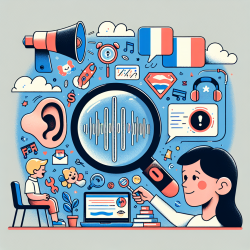In recent years, the landscape of pediatric hearing assessments has been evolving, thanks to innovative programs like iHear. This program, developed by medical students from the University of Ottawa, utilizes tablet audiometry to screen grade school children for hearing impairments. The research article titled iHear: Canadian medical student based hearing assessment program for grade school children using a tablet audiometer provides valuable insights into the effectiveness and potential of such initiatives.
As a practitioner, implementing the outcomes of this research can significantly improve your practice and the outcomes for the children you serve. Here’s how:
Key Findings from the iHear Program
- Between 2014 and 2017, 753 children aged 5–9 years were assessed, with 11.4% showing abnormal results.
- Tablet audiometry demonstrated a positive predictive value of 16.9% for detecting hearing loss.
- 118 medical students were trained as iHear technicians, highlighting the program's educational impact.
Why Tablet Audiometry?
Traditional hearing assessments often require soundproof booths and desktop audiometers, which can be costly and inaccessible in many settings. Tablet audiometry, as used in the iHear program, offers a portable, cost-effective alternative with high sensitivity and specificity (93.3% and 94.5%, respectively).
Implementing Tablet Audiometry in Your Practice
Here are steps to integrate tablet audiometry into your practice:
- Training: Ensure that your team is well-trained in using tablet audiometry. The iHear program includes a comprehensive training module that could serve as a model.
- Equipment: Invest in reliable tablet audiometry equipment, such as the SHOEBOX® Audiometry used in the iHear program.
- Screening Protocol: Develop a screening protocol similar to iHear’s, targeting young children and ensuring follow-up for those with abnormal results.
- Collaboration: Partner with local audiologists and otolaryngologists to streamline referrals and ensure comprehensive care.
Encouraging Further Research
The iHear program’s success underscores the need for more research in this area. Practitioners can contribute by:
- Participating in Studies: Collaborate with academic institutions to participate in or conduct studies on tablet audiometry.
- Data Collection: Systematically collect and analyze data from your practice to contribute to the broader knowledge base.
- Publishing Findings: Share your findings in professional journals and conferences to help advance the field.
By embracing innovative technologies like tablet audiometry and actively engaging in research, practitioners can play a crucial role in early detection and intervention for pediatric hearing loss, ultimately improving outcomes for children.
To read the original research paper, please follow this link: iHear: Canadian medical student based hearing assessment program for grade school children using a tablet audiometer.










